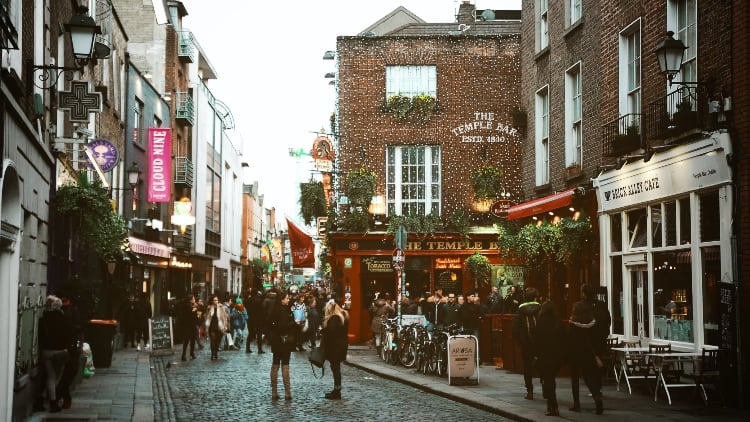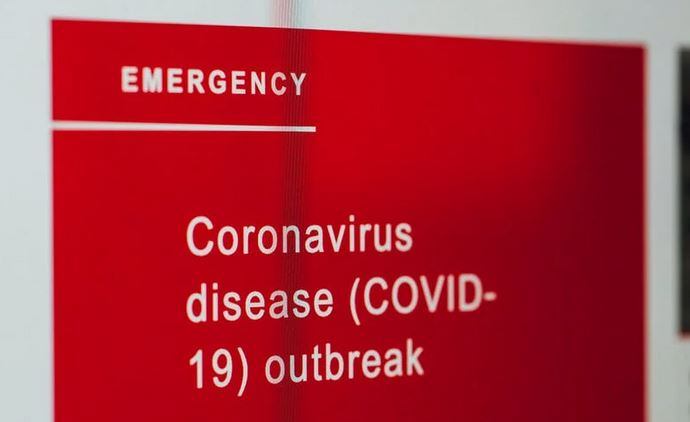On 16 April, the Government announced a three-week lockdown extension following a Cobra emergency committee meeting, meaning Brits will continue to live and work behind closed doors until at least mid-May.
On top of this, Government adviser Professor Neil Ferguson, of Imperial College London, told the BBC yesterday (16 April) the UK must keep a “significant level” of social distancing until a vaccine for coronavirus is found.
However, despite the ongoing flux around exactly when and how the UK will begin to emerge from Covid-19 shutdown, the Government has faced calls from the likes of new Labour leader Sir Keir Starmer to publish its exit strategy as a number of countries across Europe and further afield begin to set out their post-pandemic stalls.
While the Daily Mail revealed a report had been sent to ministers suggesting that coffee shops, restaurants and estate agents should be among the first businesses to reopen – as they are said to be most likely to boost the economy while posing the smallest risk of spreading the virus – a number of pub companies appear to be working towards a July restart.
East Anglia-based pub operator Chestnut, for example, outlined that it will be taking reservations across its 11-strong stable from July 1 while Peach Pubs managing director Hamish Stoddart has made a mental note of the same date for his 19 pubs to reopen. What’s more, nationwide operator Revolution Bars has agreed an increase to its overdraft facility with July trade recommencement in mind.
As reported by The Morning Advertiser (MA) on 17 April, BBPA chief executive Emma McClarkin said that Britain's pubs would need a minimum of three weeks notice to reopen after lockdown measures are lifted.
“The reopening process for the pub trade will be enormously hard and it’s imperative the Government work with the trade to get it right, or else the situation would see even more pubs close,” she said.
But, with nothing yet set in stone, is there anything to be learned about when the UK’s pubs will reopen – and what they’ll look like when they do – from overseas?
Ireland
Within days of Ireland’s government calling time on its St Patrick’s Day parade on 9 March, the majority of the Emerald Isle’s pubs closed out of respect for new protective measures being implemented even before an official on-trade shutdown was introduced on 15 March.
While a three-week lockdown extension announced on 10 April means restrictive measures will now be in place until at least 5 May, a statement by Ireland’s government when introducing the pub shutdown suggests it will be taking a cautious approach to reopening once lockdown is lifted.
“The Licenced Vintners Association and Vintners Federation of Ireland outlined the real difficulty in implementing the published guidelines on social distancing in a public house setting, as pubs are specifically designed to promote social interaction in a situation where alcohol reduces personal inhibitions,” a Government statement on 15 March explained.
Update - 4 May 2020: The Irish government announced a five-phase plan for Ireland to reboot its economy post-shutdown with cafes and restaurants due to reopen on 29 June and pubs and nightclubs scheduled to open last on 10 August under social distancing measures. The 10 August date will be when large social gatherings can also begin again.
While Ireland is working towards a 10 August opening date for pubs, business minister Heather Humphreys stated that this opening date could yet change depending on the number of new Covid-19 cases.
"If we can keep the virus under control there is now a pathway for the hospitality sector so restaurants can be back by the end of June, hotels by mid-July and pubs by 10 August," she explained. "Many of them had concerns they wouldn't be able to open at all this year so I actually think the sector can take a lot of heart from the roadmap.”
Central Europe
The European Commission has urged EU member states to co-ordinate their gradual relaxation of lockdown measures, with its preferred approach being that businesses, shops and schools should lead the way followed by the limited reopening of restaurants, bars and cafés.
In keeping with this, French president Emmanuel Macron revealed in a national address on 13 April that France would begin to lift lockdown measures on 11 May with nurseries, schools and colleges to be “progressively opened” first and foremost.
While he added that hospitality businesses would stay closed for much longer – with none expected to open before mid-July at the earliest – he outlined that specific aid will be granted to businesses in the tourism, culture, hospitality and events sectors in the meantime.
Britain, which is several weeks behind France in terms of lockdown, would be on course for a reopening date in mid-August for pubs if it were to follow the French timetable.
In recent weeks, the German government has been commended for its handling of the pandemic, with its vast testing programme yielding a far lower number of deaths than its neighbours.
A dip in cases at the start of April saw chancellor Angela Merkel come under pressure to ease restrictions – with hundreds taking to the streets of Berlin to protest to end the lockdown on 14 April. However, on 16 April it was widely reported that Germany’s new coronavirus cases and daily death toll had climbed for the first time in a week.
Yet, while schools and a number of businesses are currently scheduled to reopen on 4 May under Government plans, restaurants, bars and pubs will remain closed.
What’s more, the German government has extended social distancing measures – requiring people to maintain a distance of 1.5 metres and limit public gatherings to just two people with the exception of family members – until 3 May with large gatherings to remain banned at least until 31 August.
Southern Europe
Italy was one of the first European countries to see Covid-19 infections spike – with its death toll of more than 20,000 among the world’s highest. However, it allowed a number of non-essential businesses to open on 14 April – with garden centres, DIY stores and small shops permitted to trade albeit under strict rules on social distancing – despite extending its lockdown until 3 May.
At present, however, it remains unclear when the country’s pubs and bars will reopen.
Similarly, Spain is also taking steps to exit Covid-19 lockdown. While bars and restaurants remain closed, several hundred thousand non-essential workers have returned to work following the recommencement of the manufacturing and construction industries.
Like Italy, it is unclear when Spain’s bars will reopen. However, comments in the Daily Mail from drink supplier Derek Payne suggest that when they do, bars in Benidorm may cut the price of a pint to 50p in a bid to match supermarket pricing and entice holidaymakers back to the tourist hot spot.
Scandinavia
Sweden initially took a soft approach to the ongoing pandemic. Its hospitality venues were allowed to remain open and while some are still operating, others have been forced to close due to a lack of trade.
In a statement on 24 March outlining new rules to minimise the risk of Covid-19, director-general of Sweden's Public Health Agency Johan Carlson explained those hospitality venues still open would be subject to tight restrictions to limit the virus’s spread.
“All (restaurant, bar, nightclub and café) owners must make a plan for how to limit the spread of infection,” he said. “We will only allow seated table service, no counter service or hanging at bar counters. We are also urging them to make sure there is enough space between tables and so on.”
After recording a greater number of deaths than Nordic neighbours Finland, Norway and Denmark combined, however, Sweden’s parliament has passed a new law that gives its government temporary extra powers to bypass parliament to adopt emergency measures – including the right to close businesses and limit public events – to curb the spread of Covid-19.
Denmark, in contrast, is taking gradual steps to come out of lockdown five weeks after measures were imposed on 16 March – faster than its authorities had originally planned.
The Danes are taking a phased approach to reopening businesses, with small non-essential shops to open first followed by shopping malls and hairdressers.
While it has stated that hospitality businesses could open as early as mid-May, the Danish government says that if cases start to rise again, it will reimpose restrictions.
China
Lockdown has been formally lifted for the 11m people living in Wuhan – where the pandemic began – after two-and-a-half months battling Covid-19.
On 9 April, drinks maker Diageo, said trade in a number of China’s bars and restaurants had resumed as the country cautiously emerges from restrictions – though a number of safety measures are said to be in place in hospitality venues.
“In mainland China, we are beginning to see a very slow return of on-trade consumption, as restaurants and bars have started to gradually reopen,” a Diageo spokesperson told the Financial Times.
Australia and New Zealand
New Zealand’s full lockdown was imposed on 26 March when the country had 363 confirmed cases – compared to the UK’s which came into effect when there were 6,650 – with schools, bars and restaurants having already closed two days earlier.
However, on 10 April, New Zealand’s Prime Minister Jacinda Ardern revealed that the country was “turning a corner” in the battle against coronavirus after recording the lowest number of new cases in three weeks, and that it could start to move towards lifting full lockdown measures.
Hospitality NZ has stated it is working on a technological solution to help its pubs meet the requirement to maintain a guest register when they eventually reopen. However, the sector body is waiting to see whether the government’s work on a contact tracing app supplement or supersede its own plans.
Across the Tasman Sea, Australia closed its pubs and restaurants on 22 March as part of lockdown restrictions.
Its government has stated that before it could end lockdown – and, therefore, consider reopening hospitality venues – it must see a clear indication that case numbers are being suppressed, there is a rapid response capability for testing and tracing Covid-19, and, once those things have been achieved, plan steps for gradual emergence from lockdown.
As reported by The Daily Mail on 19 April, professor of microbiology at the Australian National University, Peter Collignon, has warned that the nation's pubs may need to remain closed until September, suggesting that government needed to play safe because of inevitable "intermingling" in pubs and bars.
United States
President Donald Trump has been widely criticised for his handling of the Covid-19 pandemic after ignoring advice about introducing social distancing measures in the crisis’s critical early stages.
While on 16 March, Trump urged Americans to avoid eating and drinking out, the decisions to shut bars and restaurants were made on a state-by-state basis – with some moving to introduce restrictions quicker than others.
On 19 March, California was the first state to announce a stay-at-home order – with all bars, nightclubs, wineries and brewpubs across the Golden State ordered to temporarily close – while West Virginia, the last state to confirm a Covid-19 case, issued a similar order on 24 March, though restrictions on bars had already been imposed.
Delaware and New York have announced lockdown measures until 15 May, for example, while Florida’s governor Ron DeSantis suspended all bars and nightclubs from opening for 30 days from 17 March.
While Trump, once again, faced criticism for defying experts by seeking to reopen businesses by Easter, the phased lifting of lockdown will be undertaken on a state-by-state basis with the support of federal government, according to the president’s ‘Opening up America Again’ plan.
What’s more, according to researchers from the Harvard T.H. Chan School of Public Health, which published its findings in the journal Science on 14 April, the US may have to endure social distancing measures – such as stay-at-home orders – until 2022.




